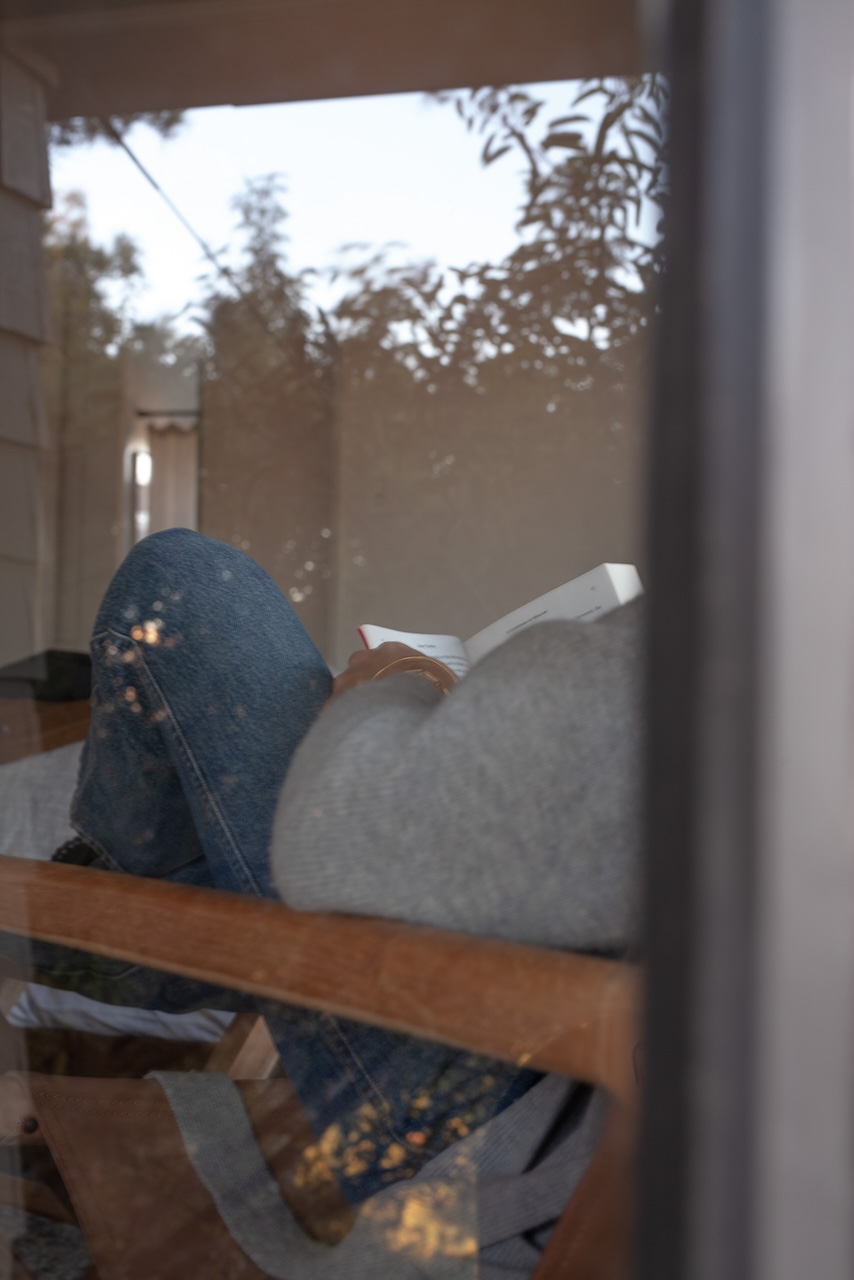This post contains insights from the latest Girls Night podcast episode. Listen to the full episode [here].
The night before my family was supposed to move to Spain for a year-long adventure, I was lying in my brother-in-law's guest bedroom having what can only be described as a complete freak-out.
Our bags were packed. Our house was rented out. Our cars were sold. Our three-year-old twins were finally asleep in the next room, and in just a few hours, we'd be heading to the airport for what I knew would be a life-changing experience.
And all I could think was: What have I done?
If there had been an eject button in that moment, I would have pressed it without hesitation. The terror I felt was overwhelming — this crushing sense that we were making a terrible mistake that would ruin our children's lives and destroy our family's future.
But here's the thing that changed everything for me: I recognized this feeling.
The Second-Guessing Trap That Keeps Us Stuck
That feeling of totally freaking out in Chicago wasn't unique. I'd felt it before every major positive change in my life — before getting married, before buying our house, before starting my business, before every big trip or life transition.
I used to interpret that fear as a warning sign. If I'm this scared, I'd think, it must mean I'm making a mistake.
But what I've learned is this: the emotional aftermath of a decision is not an accurate indicator of the rightness or wrongness of that decision.
This is what I call the second-guessing trap, and it's everywhere in your Everything Era. Here's how it works:
- You make a thoughtful decision based on your values and best judgment
- The natural emotional consequences kick in (fear, sadness, discomfort, uncertainty)
- You interpret those feelings as signs you made the wrong choice
- You second-guess or even reverse a decision that was actually perfectly good
Sound familiar?
Why Our Emotions Mislead Us About Our Decisions
Every significant choice involves loss. When you choose one thing, you're not choosing something else. When you commit to a relationship, you're giving up the freedom of being single. When you take a new job, you're leaving the familiar comfort of your old one. When you move somewhere new, you're leaving behind the place you know.
The sadness, fear, and discomfort that follow big decisions aren't signs you chose wrong — they're signs you chose something that matters.
But we've been conditioned to interpret any negative emotion as a red flag. We think if we're feeling uncertain or uncomfortable, it must mean we're on the wrong path. So we second-guess decisions that were actually perfectly good, and sometimes we even reverse them.
I see this constantly with women in our community:
- They'll break up with someone who wasn't treating them well, but then feel so lonely that they convince themselves they should get back together
- They'll quit a job that was making them miserable, but then feel so scared about their future that they think they made a mistake
- They'll move to a new city for better opportunities, but feel so homesick that they question whether they should have left
The Key: Understanding Your Decision-Making Patterns
The breakthrough for me came when I started recognizing my patterns. Here are some of mine:
Pattern #1: I always get scared right before big leaps. That complete terror I felt before Spain? I've felt it before every major positive change. Now I know it doesn't mean I'm making a mistake — it means I'm about to do something brave.
Pattern #2: I get veryyyy nostalgic during transitions. When I'm leaving something good for something else that's also good, I get so nostalgic about what I'm leaving and almost resentful toward what I'm moving toward — even when I chose it and want it. (It almost feels like the thing I'm going toward is taking away the thing I'm leaving behind).
Pattern #3: I doubt myself most when I'm tired or hormonal. My confidence in my decisions fluctuates with my energy levels and my cycle. When I start second-guessing myself, I'm getting better at checking: when did I last eat? How much sleep did I get? Where am I in my cycle?
Pattern #4: I make my best decisions after processing, not while upset. I need space to say all the things I'm thinking, then time to sit on decisions — not make them in the heat of emotion.
Pattern #5: I'm always the saddest before a big change, transition, or goodbye. The lead-up is WAY harder for me than the actual moment or even the aftermath.
When I recognized these patterns, everything changed. I stopped letting temporary emotional states override thoughtful decisions I'd made from a clear headspace.
How This Applies to Your Everything Era Decisions
Let's get practical about how this applies to the specific decisions you're facing:
Career Decisions
You might feel impostor syndrome or anxiety about new challenges, and interpret that as “I'm not ready” or “this isn't right for me.” Reality check: Do you always feel nervous before taking on new responsibilities? If so, that nervousness might just be your pattern, not a sign you shouldn't do it.
Relationship Decisions
After ending a relationship, you feel so sad that you think you made a mistake. Or before committing to someone, you feel so scared of being hurt that you convince yourself they're not right. Reality check: What are your typical responses to relationship changes? Do you always feel sad after breakups, even when you initiated them for good reasons? (I know I did!!) Do you find yourself pulling back right when it's time to commit? (Even and especially if it's a good thing you're committing to?)
Living Situation Decisions
You feel homesick or lonely in the first few months somewhere new, and interpret that as “I shouldn't have moved.” Reality check: How long does it usually take you to feel settled in new places? Do you always miss home at first, even when you're happy with your choice to leave? (I do!! 🙋♀️)
Your Practical Action Plan
Here's how to start using this in your own life:
Step 1: Map Your Decision History
Think back to your last 3-5 major decisions. For each one, write down how you felt before making it, immediately after, a month later, and now. Look for patterns.
Step 2: Identify Your Decision-Making Sweet Spot
When do you make your best decisions? When you're well-rested? After you've exercised? Plan to make important choices during these times.
Step 3: Create Pattern Reminders
Based on what you've learned, create reminders like: “I always feel scared before big changes, but that fear has never been a good predictor of whether the change was right.”
Step 4: Build in Adjustment Time
Stop expecting yourself to feel good about big decisions immediately. Most significant changes require an adjustment period where you feel uncomfortable — that's normal, not a sign you chose poorly.
Step 5: Practice the 24-Hour Rule
When you catch yourself second-guessing a decision, give yourself at least 24 hours before acting on that doubt. Ask yourself: “Is this doubt giving me new information, or is this just my typical response to change?”
The Spain Ending (And Your New Beginning)
This year in Spain? It's been absolutely incredible. We lived on the top floor, in a beautiful little apartment in the heart of Granada. We traveled to 11 different countries as a family (and with my best friend and her family!), and created memories we'll treasure forever. If I had let that pre-leap freak-out convince me to call it off, we would have missed out on something beautiful simply because I didn't understand my own patterns.
Right now, you're probably facing decisions that feel just as scary. Career moves, relationship choices, family planning, location changes — they all come with that same emotional intensity that makes you want to second-guess everything.
But here's what I want you to remember: second-guessing your decisions isn't a character flaw, and it doesn't mean you're bad at making choices. It usually just means you're human, and you're making decisions that matter.
The goal isn't to eliminate all doubt or negative emotions around your choices. The goal is to understand your patterns well enough that you don't let temporary emotional states override thoughtful decisions you made from a clear headspace.
Start paying attention to your patterns. Start naming what you're feeling and why. Start building in adjustment time for big changes. And start trusting that you're more capable of making good decisions than your anxious moments would have you believe.
For more on understanding your emotional patterns and preparing for major life transitions, check out my courses: Love Your Single Life for thriving in singleness, Just Married for laying a strong foundation for your marriage, and Becoming Mama for motherhood preparation.
And don't miss this week's full Girls Night episode where I share even more practical strategies for decision-making confidence.
Want weekly wisdom for your Everything Era?
Listen to Girls Night wherever you get your podcasts and join thousands of women who are learning to trust themselves and create lives they love.




+ show Comments
- Hide Comments
add a comment